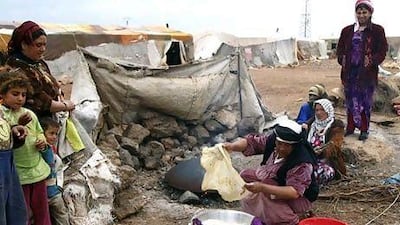Dara'a, southern Syria, May 2007. Although it was barely summer, the fields were already yellow and parched. It was the second year of a drought that would last for four years.
Damascus's Al Hamidiyeh Souq was already crowded with refugees from the violence in Iraq. Now, around Homs and suburbs in the capital such as Douma, slums and shanty towns were packed with rural migrants.
Syria's drought was its longest for a century. As the climate security researcher Shahrzad Mohtadi notes, this fits with scientists' predictions that global warming would cause the Mediterranean region to dry out.
The regime of the Al Assads, both Hafez and Bashar, disastrously mismanaged the water issue. They subsidised thirsty cotton and wheat, then allowed over-extraction of groundwater, causing aquifer levels to sink. Fields were turning into deserts.
In 2005, Syria sold much of its emergency wheat reserve to make a quick gain from high prices, but in 2008, it had to import wheat for the first time in 20 years.
In the fourth year of drought, 2009, Turkey cut water flows to Syria, affecting also downstream Iraq.
The Kurds of the hard-hit north-east, forbidden to dig new wells, were pushed by intensified state repression and the collapse of their livelihoods to organise politically, as a United States embassy cable details.
By last year, a million Syrians were going hungry, and two to three million had sunk into extreme poverty.
Soaring global food prices exacerbated the problem; many of the climate migrants were surviving solely on bread and sugared tea. Inspired by the revolutions elsewhere in the Arab world, it took just one incident of state brutality in Dara'a to trigger the uprising.
The idea that drought may have contributed to the discontent does not absolve the regime from blame.
Quite the opposite - it demonstrates the Al Assads' failure to build much beyond a mafia state. While crops and livestock were perishing in the countryside, crony capitalism created a superficial prosperity in the big cities.
Climate change can be another driver of instability in this water-scarce region, overloading already weak, incompetent or corrupt regimes.
Northern Iraq and Jordan suffered from the same drought that struck Syria. Egypt is threatened by rising sea levels in the Delta and use of the Nile by Ethiopia upstream.
Yemen is in the grip of a severe water shortage, with more than half of children malnourished. Pakistan depends on glaciers feeding the Indus.
Even the wealthy Arabian Gulf countries are vulnerable to conflict or state collapse beyond their borders, disruption to trade routes or an influx of refugees. They can be affected by natural disasters in global breadbaskets too - 85 per cent of the UAE's food is imported.
So the more stable Middle East governments need to be taking tangible steps to reduce their greenhouse gas emissions, and playing a constructive role at this November's climate conference in Doha.
The region should be investing in climate resilience: research in dry-land agriculture and drought-resistant crops; coordinating transnational water rights; improving irrigation and water storage; reducing water waste and subsidies; alleviating poverty and managing internal migration.
Any post-Al Assad Syrian government will have to deal with the challenges of revitalising agriculture, restoring a healthy rural economy and improving the country's resilience to drought. It will have to do this without the benefit of much oil money, and while rebuilding ruined cities.
Governments with their people's best interests at heart must, and can, cope better with the changing climate. Beyond justifiable outrage at the regime's repression and atrocities, Syria's drought reveals the climatic influence on revolution.
Robin Mills is the head of consulting at Manaar Energy, and the author of The Myth of the Oil Crisis and Capturing Carbon


